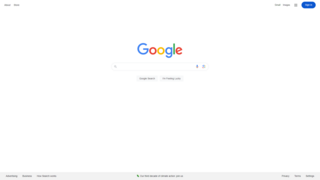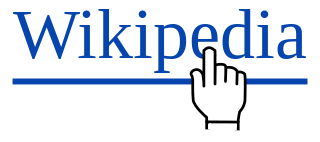
Google Search is a search engine owned and operated by Google. Handling more than 3.5 billion searches per day, it has a 92% share of the global search engine market. It is the most-visited website in the world. Approximately 26.75% of Google's monthly global traffic comes from the United States, 4.44% from India, 4.4% from Brazil, 3.92% from the United Kingdom, 3.84% from Japan and the remaining 56.65% from other countries according to data provided by Similarweb.
Meta elements are tags used in HTML and XHTML documents to provide structured metadata about a Web page. They are part of a web page's head section. Multiple Meta elements with different attributes can be used on the same page. Meta elements can be used to specify page description, keywords and any other metadata not provided through the other head elements and attributes.
Spamdexing is the deliberate manipulation of search engine indexes. It involves a number of methods, such as link building and repeating unrelated phrases, to manipulate the relevance or prominence of resources indexed in a manner inconsistent with the purpose of the indexing system.
Search engine optimization (SEO) is the process of improving the quality and quantity of website traffic to a website or a web page from search engines. SEO targets unpaid traffic rather than direct traffic or paid traffic. Unpaid traffic may originate from different kinds of searches, including image search, video search, academic search, news search, and industry-specific vertical search engines.

On the World Wide Web, a link farm is any group of websites that all hyperlink to other sites in the group for the purpose of increasing SEO rankings. In graph theoretic terms, a link farm is a clique. Although some link farms can be created by hand, most are created through automated programs and services. A link farm is a form of spamming the index of a web search engine. Other link exchange systems are designed to allow individual websites to selectively exchange links with other relevant websites, and are not considered a form of spamdexing.
A webmaster is a person responsible for maintaining one or more websites. The title may refer to web architects, web developers, site authors, website administrators, website owners, website coordinators, or website publishers.
Google AdSense is a program run by Google through which website publishers in the Google Network of content sites serve text, images, video, or interactive media advertisements that are targeted to the site content and audience. These advertisements are administered, sorted, and maintained by Google. They can generate revenue on either a per-click or per-impression basis. Google beta-tested a cost-per-action service, but discontinued it in October 2008 in favor of a DoubleClick offering. In Q1 2014, Google earned US$3.4 billion, or 22% of total revenue, through Google AdSense. AdSense is a participant in the AdChoices program, so AdSense ads typically include the triangle-shaped AdChoices icon. This program also operates on HTTP cookies. In 2021, over 38.3 million websites use AdSense.

Webs, formerly Freewebs, is a freemium, primarily static site-only web host founded in 2001. The service offers free and premium website hosting plans, and their own templated website building service. Unusually, Webs does not offer any dynamic content support aside from their own dynamic "apps", despite offering FTP access and allowing HTML uploads.

The anchor text, link label or link text is the visible, clickable text in an HTML hyperlink. The term "anchor" was used in older versions of the HTML specification for what is currently referred to as the a element, or <a>. The HTML specification does not have a specific term for anchor text, but refers to it as "text that the a element wraps around". In XML terms, the anchor text is the content of the element, provided that the content is text.
Yahoo! Search is a search engine owned and operated by Yahoo!, using Microsoft Bing to power results.

Baidu, Inc. is a Chinese multinational technology company specializing in Internet-related services, products, and artificial intelligence (AI), headquartered in Beijing's Haidian District. It is one of the largest AI and Internet companies in the world. The holding company of the group is incorporated in the Cayman Islands. Baidu was incorporated in January 2000 by Robin Li and Eric Xu. Baidu has origins in RankDex, an earlier search engine developed by Robin Li in 1996, before he founded Baidu in 2000.
Search engine marketing (SEM) is a form of Internet marketing that involves the promotion of websites by increasing their visibility in search engine results pages (SERPs) primarily through paid advertising. SEM may incorporate search engine optimization (SEO), which adjusts or rewrites website content and site architecture to achieve a higher ranking in search engine results pages to enhance pay per click (PPC) listings and increase the Call to action (CTA) on the website.
Local search is the use of specialized Internet search engines that allow users to submit geographically constrained searches against a structured database of local business listings. Typical local search queries include not only information about "what" the site visitor is searching for but also "where" information, such as a street address, city name, postal code, or geographic coordinates like latitude and longitude. Examples of local searches include "Hong Kong hotels", "Manhattan restaurants", and "Dublin car rental". Local searches exhibit explicit or implicit local intent. A search that includes a location modifier, such as "Bellevue, WA" or "14th arrondissement", is an explicit local search. A search that references a product or service that is typically consumed locally, such as "restaurant" or "nail salon", is an implicit local search.
The Sandbox effect is a name given to an observation of the way Google ranks web pages in its index. It is the subject of much debate—its existence has been written about since 2004, but not confirmed, with several statements to the contrary.

A search engine is a software system that finds web pages that match a web search. They search the World Wide Web in a systematic way for particular information specified in a textual web search query. The search results are generally presented in a line of results, often referred to as search engine results pages (SERPs). The information may be a mix of hyperlinks to web pages, images, videos, infographics, articles, and other types of files. Some search engines also mine data available in databases or open directories. Unlike web directories and social bookmarking sites, which are maintained by human editors, search engines also maintain real-time information by running an algorithm on a web crawler. Any internet-based content that cannot be indexed and searched by a web search engine falls under the category of deep web. Modern search engines are based on techniques and methods developed in the field of Information retrieval.
Website monitoring is the process of testing and verifying that end-users can interact with a website or web application as expected. Website monitoring are often used by businesses to ensure website uptime, performance, and functionality is as expected.

Taobao is a Chinese online shopping platform. It is headquartered in Hangzhou and is owned by Alibaba. According to Alexa rank, it was the eighth most-visited website globally in 2021. Taobao.com was registered on April 21, 2003 by Alibaba Cloud Computing (Beijing) Co., Ltd.

Bing Webmaster Tools is a free service as part of Microsoft's Bing search engine which allows webmasters to add their websites to the Bing index crawler, see their site's performance in Bing and a lot more. The service also offers tools for webmasters to troubleshoot the crawling and indexing of their website, submission of new URLs, Sitemap creation, submission and ping tools, website statistics, consolidation of content submission, and new content and community resources.
Yandex Search is a search engine. It is owned by Yandex, based in Russia. In January 2015, Yandex Search generated 51.2% of all of the search traffic in Russia according to LiveInternet.
Google Penguin was a codename for a Google algorithm update that was first announced on April 24, 2012. The update was aimed at decreasing search engine rankings of websites that violate Google's Webmaster Guidelines by using now declared Grey Hat SEM techniques involved in increasing artificially the ranking of a webpage by manipulating the number of links pointing to the page. Such tactics are commonly described as link schemes. According to Google's John Mueller, as of 2013, Google announced all updates to the Penguin filter to the public.







